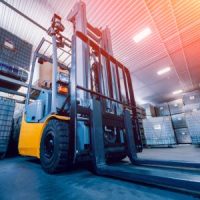Does Violating Industry Standards Prove Negligence In A Georgia Personal Injury Lawsuit?

Construction accidents are often the result of a failure to follow well-established industry standards regarding safety. Now, under Georgia law the violation of private industry guidelines does not, in and of itself, establish negligence for purposes of a personal injury lawsuit. But such violations can be cited as evidence in support of an “ordinary negligence” claim.
Federal Judge Allows Defective Construction Forklift Lawsuit to Proceed
A federal judge in Atlanta recently addressed this subject in an ongoing case, Strozier v. Herc Rentals, Inc., involving a serious construction accident that occurred in April 2017. The defendant in this case is a company that rents construction equipment. Here, the owner of a construction company rented a lift from the defendant to assist in a project involving the replacement of fascia boards near the roof of an apartment complex.
The owner of the construction company and three of his employees, one of whom is the plaintiff in this case, attempted to operate the lift without success. The owner then called the defendant, which sent a service technician to the job site to offer assistance. The technician identified the problem and offered additional training on how to use the lift, but the construction company owner said he was an experienced operator and did not require further instruction.
Once the lift was running, one of the employees drove it closer to the apartment building while the plaintiff and his other co-worker were in the lift’s basket. At some point, the lift “made a clicking noise,” according to court records and tipped over, throwing the two men out of the basket. The plaintiff sustained serious injuries and his co-worker was killed.
The plaintiff subsequently sued the defendant, alleging it was negligent in renting the lift to his employer. The plaintiff cited alleged violations of three accepted industry standards. These standards involved requiring a dealer in construction equipment to provide proper training and “familiarization” with the equipment to its customer. The judge said these standards were inapplicable here, as any such duties were owed to the plaintiff’s employer–the company that rented the equipment–and not him personally.
Nevertheless, the judge held that one of the plaintiff’s claims–negligent bailment–could proceed to trial. This involved a statutory duty under Georgia law related to rental property. In this case, the plaintiff alleged that the defendant had delivered the lift with a defective tilt alarm. If proven at trial, the plaintiff could claim damages based on such a defect.
Speak with an Atlanta Construction Accident Attorney Today
Construction workers are often injured–even killed–as a result of a failure to observe basic safety precautions or, as demonstrated in the case above, due to faulty equipment. That is why if you or a loved one have been harmed , it is important to seek out a qualified Atlanta forklift and crane accident lawyer who can review your case and help you take legal action against the responsible parties. Contact Shiver Hamilton Campbell today to schedule a free consultation.
Source:
scholar.google.com/scholar_case?case=6207697961756418171


